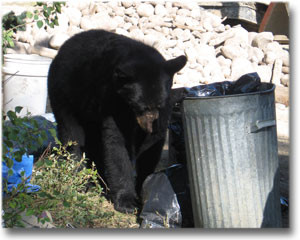Non-urgent government operations are closed December 24 to January 1, reopening January 2. View available services during this period.
Living in bear country
If you live in bear country, you should know this bear safety information.
Keep bears wild and out of your backyard

- Keep your garbage and recyclable bottles and cans in bear-resistant, airtight containers.
- Keep your compost indoors. Outdoor compost attracts bears. Look into using an indoor composter.
- Remove bird feeders from your yard in the months when bears are active – usually from the beginning of April until the end of November. Be sure to clean up any spilled bird seed from the ground.
- Clean your barbecues. Scrub your barbecue clean after each use and store it in a bear-resistant building, such as the garage or shed.
- Consider removing fruit trees and berry-producing bushes from your property. Bears are attracted to the fruit and berries. If you must keep the trees, pick the ripening fruit as early as possible and store them in secure, airtight containers.
- Never leave food out for wildlife.
- Talk to your neighbours. Let your neighbours know if you've seen a bear in the community, and talk to them about being BearSmart at home.
- Call Fish and Wildlife for more advice. Find your nearest Fish and Wildlife office by calling 310-0000.
Teach your children about being safe around bears
- Do not approach the bear or irritate it by yelling or throwing things at it.
- Never run away from a bear. Back away slowly and find a safe place, such as a building or vehicle.
- Stay with your group and back away from the bear together.
- As soon as you have reached a safe place, tell an adult that you have seen a bear.
- Stay away from areas that may attract bears, such as garbage bins, berry patches and along creeks and rivers.
- Bears are more active at dusk, night and dawn. Children should play close to the house and under supervision during those times.
Keep your pets safe
- Always keep your dog on a leash. Keeping your dog on a leash keeps it under your close control. It also prevents the dog from sniffing out and provoking a bear into an encounter.
- Feed your pets and store pet food indoors. Keeping pet food outside can attract bears. If you must feed your pets outdoors, bring in the pet food and feeders overnight when bears are most active.
If you encounter a bear
All bears are individuals so all bear encounters will be unique. Serious attacks are rare, but you must always be cautious and alert when in bear territory.
If you see a bear in your backyard
- Do not panic. Do not run. Quickly and calmly collect your children and pets and go indoors.
- Notify your nearest Fish and Wildlife office. Call 310–0000 or 1-800-642-3800 if it is after regular business hours.
- Once the bear has left the area, remove anything from your property that might attract a bear. Ask your neighbours to do the same. If food sources in the area remain available, the bear will likely return.
Resources
Alberta BearSmart brochures
Videos
More information on the Interagency Grizzly Bear Committee (IGBC) certified bear-resistant products, at Bear-Resistant Products.
Previous
Bears and outdoor recreation